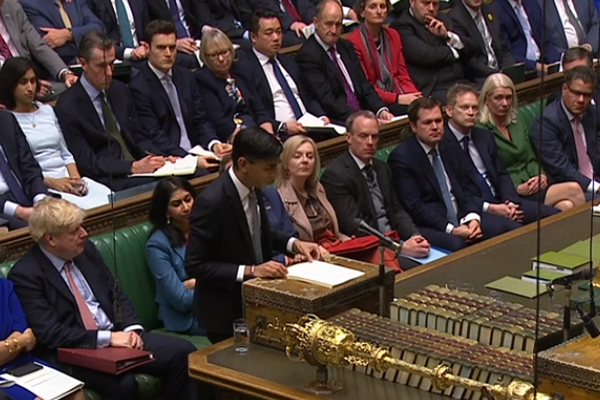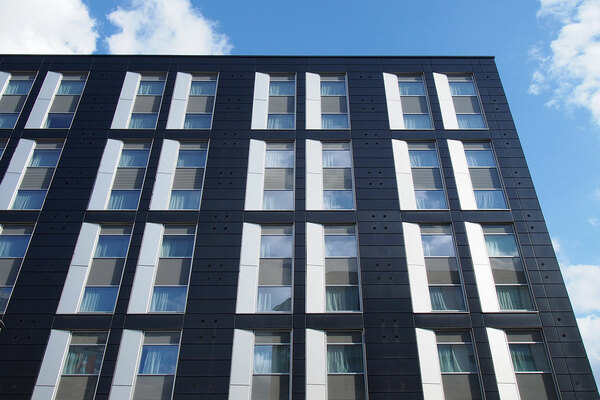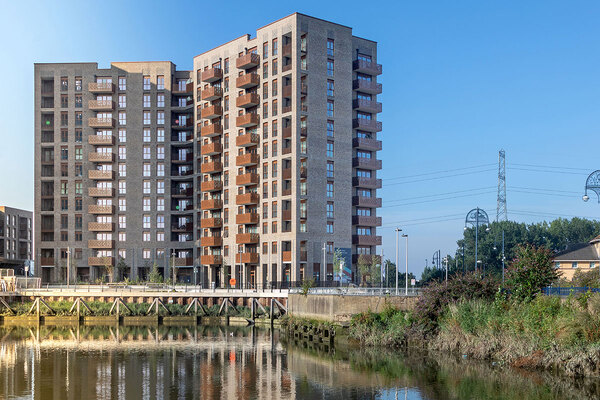You are viewing 1 of your 1 free articles
Fire safety costs ‘could still hit development pipelines’ despite £1bn fund
Fire safety costs could still impact social landlords’ plans to build new homes despite the government’s announcement of an extra £1bn for removing dangerous cladding, sector figures have warned.
Chancellor Rishi Sunak unveiled the new Building Safety Fund during his Budget speech on Wednesday, saying it will “make sure that all unsafe combustible cladding will be removed from every private and social residential building above 18m”.
The funding – which is on top of the £600m already announced for removing Grenfell-style aluminium composite material from high rises – represents a major win for the thousands of leaseholders facing huge bills to remove dangerous cladding from their blocks and the End Our Cladding Scandal campaign that Inside Housing runs alongside them.
But with the National Housing Federation estimating that housing associations’ post-Grenfell fire safety costs will easily top £10bn and buildings below 18m excluded, there are concerns about how the fund will be allocated.
Costs split among the largest housing associations in London alone are expected to hit between £4.3bn and £6.9bn, with costs at L&Q alone potentially reaching £450m.
The Ministry of Housing, Communities and Local Government (MHCLG) said it expects social housing providers that are funding removal work to continue to do so without accessing the fund “so we can prioritise this funding on those who cannot afford the cost, creating a barrier to remediation and safety”.
Mark Washer, chief executive of Sovereign, warned that this approach could see housing associations build fewer new homes.
He said: “I think government has to understand that there will be choices that organisations have to make and building safety has to come first, and that can mean that we’re not necessarily focused on new supply as the one priority.”
Paul Hackett, chief executive of Optivo, said housing associations’ fire safety bills “affect our interest cover ratios, which affect the capacity of the sector to build new homes”.
“There is a really strong case to support housing associations with these costs,” he added.
Kate Davies, chief executive of Notting Hill Genesis, said housing associations “desperately need support to do the work”.
The MHCLG also added that the total £1.6bn investment “will be the limit to the government’s funding for remediation”.
That is despite housing secretary Robert Jenrick saying in January that “there has not been enough focus among building owners on buildings below 18m”.
Minutes previously leaked to Inside Housing indicated that the National Fire Chiefs Council (NFCC) had advised a group of local authorities that buildings’ risk should be assessed on more than height alone.
They record Nick Coombe, lead on the implementation of the Hackitt Review and post-Grenfell fallout at the NFCC, telling London boroughs at a meeting convened by MHCLG: “Buildings should be assessed on risk eg a 17m building with ACM Cat 3 [category three – indicating the most combustible polythene-cored cladding] is clearly more dangerous than an 18m building with no ACM.”
The NFCC is a core member of the government’s expert panel.
The number of buildings with unsafe cladding less than 18m tall is unknown, but there are 100,000 buildings between 11m and 18m in height, compared to just 12,000 taller than 18m.
Pre-Grenfell guidance placed no restrictions on the use of combustible cladding below this threshold, meaning the required remediation work is likely to be substantial.
Darren Rodwell, the leader of Barking and Dagenham Council and executive member for housing and planning at London Councils, which represents London’s 32 boroughs and the City of London, said: “London boroughs urge the government to reconsider the commitment to remediation only on buildings over 18m high when there is still unsafe cladding on buildings below that threshold.”
Clare Norton, executive committee member of the G320 group of smaller London housing associations and chief executive of the Peter Bedford Housing Association, said: “The broad commitment to remove ‘unsafe’ materials is very welcome as this will remove some uncertainty where materials other than ACM pose a fire risk.
“However, how materials are removed from complex buildings which are not tall remains a question, as does whether there is any funding for interim remedial measures.”
The government announcement also suggested remediation work would be limited to buildings with cladding rated Euroclass C or worse. There are many buildings with Euroclass B-rated cladding that requires remediation, but may therefore fall outside the scope of the scheme.
End Our Cladding Scandal: campaign aims
- Government provides a fund to cover the cost of cladding removal and remedial works on private blocks
- A firm timescale is set out of no more than two years for the work to be carried out
- Residents are reimbursed for the interim fire safety costs incurred, and funding is to be provided for necessary internal fire safety measures identified by a competent fire risk assessor
More on the Budget 2020
Inside Housing is bringing you up-to-date news, analysis and comment from the first post-Brexit Budget.
Here are the details of all our coverage so far:
Shared ownership Right to Buy likely to be applied to all rented homes funded under £12bn programme The government is looking at allowing tenants renting homes built through the new Affordable Homes Programme the right to shared ownership of their homes
Fire safety costs ‘could still hit development pipelines’ despite £1bn fund Concerns remain in sector despite cladding removal fund
Budget 2020: an improvement on recent years but questions remain Jules Birch gives his verdict on the first post-Brexit Budget
Housing figures react to ‘positive’ Budget announcements for sector Reaction from key sector figures to the measures unveiled
The housing bits of Sunak’s speech in full Read the key passages from the chancellor’s speech to the House of Commons
PWLB rates for social housing cut to pre-hike levels The cost for councils of borrowing to fund social housing will fall
Budget 2020: the key housing measures at a glance An at-a-glance guide to the key Budget announcements for the sector
Chancellor announces additional £12bn for Affordable Homes Programme Rishi Sunak announces the largest affordable grant programme in years
£650m fund to tackle rough sleeping The chancellor promises to fund 6,000 new places for rough sleepers to live
£1bn Building Safety Fund to remove ‘all forms’ of cladding The government pledges money to make all buildings safer
Housing secretary to announce planning reforms Ministers will set plans to reform the planning system on Thursday
Pre-Budget:
What should the housing sector look out for in today’s Budget? Peter Apps runs through the issues the sector should be looking out for
The housing sector is right to feel anxious about tomorrow’s Budget The government has indicated that its main focus with regard to housing policy is homeownership. The sector should be nervous about what this means for its spending priorities, writes John Perry
What the sector wants from the chancellor James Wilmore sifts through the submissions from the sector’s biggest players to find out what they want from the Budget later today
Conservative MPs urge chancellor to use Budget to build more social housing A group of 27 Conservative MPs and the mayor of the West Midlands have written to chancellor Rishi Sunak ahead of the Budget statement to urge him to allocate more money to building social housing.
How this Budget will signal the government’s direction of travel on housing With the first post-Brexit Budget due, Kate Henderson assesses the issues on which the sector has been lobbying












